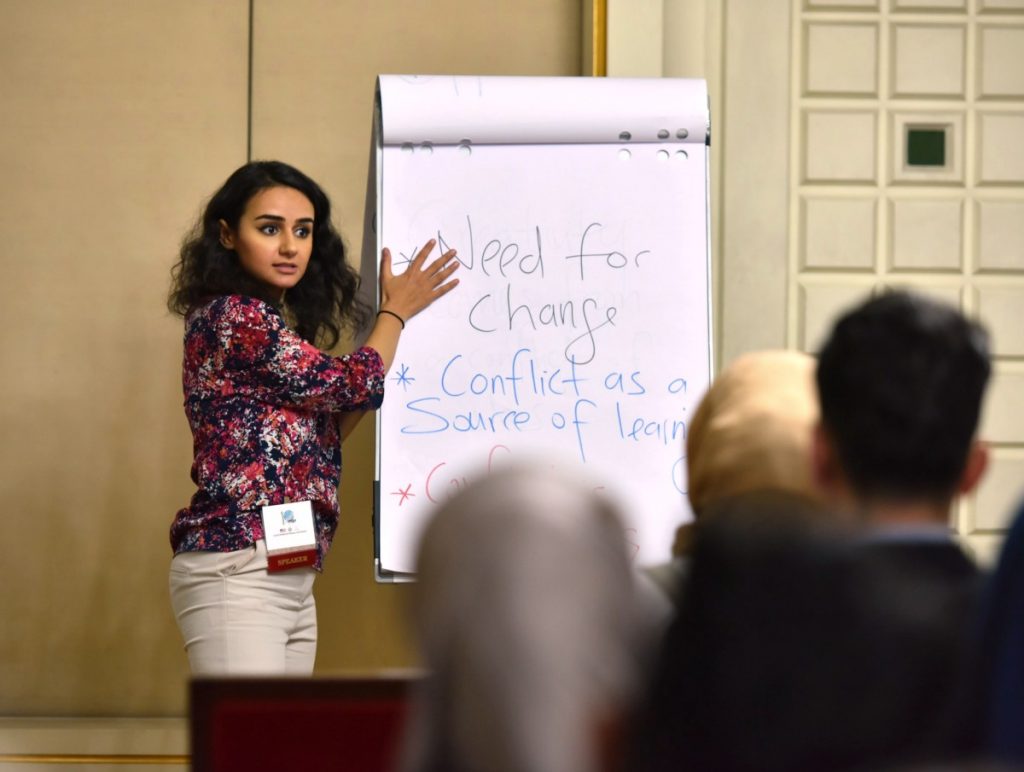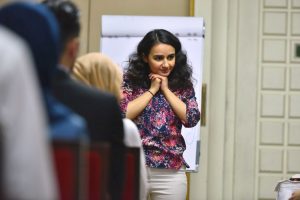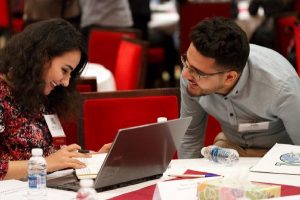-
What We Do
- WHERE WE WORK
-
About Us
 Welcome Message from Carol Jenkins
Welcome Message from Carol JenkinsFor more than 90 years, World Learning has equipped individuals and institutions to address the world’s most pressing problems. We believe that, working together with our partners, we can change this world for the better.
On my travels, I’ve had the opportunity to meet with many of those who have joined us in this mission. In Baghdad, we’ve trained more than 2,300 Iraqi youth who are already giving back at home. In London, our partners in the TAAP Initiative strongly believe that we are all responsible to practice inclusion. And in Vermont, our Experiment in International Living and School for International Training participants prove every day that they have the tools and the determination to change the world.
Please join us in our pursuit of a more peaceful and just world.
- Get Involved
Media Center > Story
How Lourd Hanna, IYLEP Alumna, is Building Peace and Understanding in Iraq
March 29, 2019

Lourd Hanna saw that things needed to change in her native Erbil, Iraq. In 2011, sectarian violence was at a high between Arab and Kurdish Iraqis. Erbil — the largest city in northern Iraq and capital of Iraqi Kurdistan — was seeing an influx of refugees from the southern part of the country and Baghdad.
“They needed help,” she says. Sixteen-year-old Hanna took that responsibility upon herself, diving into volunteer work with charities and NGOs.
She was especially motivated to get involved having just returned from four weeks in the United States through the Iraqi Young Leaders Exchange Program (IYLEP). Sponsored by the U.S. Embassy Baghdad and the U.S. Department of State and administered by World Learning, IYLEP brings Iraqi high-schoolers and undergraduates to the U.S. to learn about peacebuilding, civic engagement, and leadership.
“It was a beautiful experience,” Hanna says. “It helped in shaping who I am today.”
Before the exchange, Hanna was frustrated by the way young people were shut out of her country’s political system — the way decisions were made for them, but without them. She was curious what life was like for 16-year-old girls in the U.S. Would they be involved in making decisions for their country’s future?
No, she discovered. The teens she met in the U.S. weren’t clamoring for a seat at the table with their country’s decision-makers but were instead more focused on community service and making a difference in other small ways. “They were planting seeds to have the harvest later,” she says.
 She realized that perhaps she could do the same: if there was no place at the table for Iraqi youth, maybe they could create their own table. “We can at least express how we feel about small decisions that are connected to our lives,” she says.
She realized that perhaps she could do the same: if there was no place at the table for Iraqi youth, maybe they could create their own table. “We can at least express how we feel about small decisions that are connected to our lives,” she says.
Over the next couple of years, Hanna volunteered in her community whenever she had the opportunity — sometimes alongside her father, who ran a civil society organization.
By 2014, though, Hanna was ready to take a seat at a bigger table. That summer, ISIS invaded the Nineveh Plains, forcing out the area’s mainly Christian minority population. Many fled to Erbil, where organizations like the one where she volunteered helped them find shelter. Hanna was appointed to oversee one of those shelters, where she cared for 60 displaced Iraqi families. “It was the beginning of me taking responsibility,” she says.
As time passed, she realized she wanted to do even more. She wanted to ensure that Iraqi families would never again have to face persecution or displacement based on their religious beliefs or ethnic identities. “Why not work on something beyond the outcome of the conflict?” she asked. “Let’s go deep into the root of the conflict.”
In 2016, Hanna and two colleagues launched the Middle East Sustainable Peace Organization, a nonprofit working to build cultural bridges between the various religious and ethnic communities in Iraq. The nonprofit brought together people from all different ethnicities, religions, and genders for a series of workshops aimed at understanding one another. The participants visited mosques, churches, and Zoroastrian temples to learn from religious leaders how those faiths contribute to peace, and they visited minority communities to learn about the role of minorities in the peace process. Then the participants came together to reflect on what they learned and practice strategies for dialogue. “It was the baby steps of peacebuilding,” Hanna says.
 Hanna has since moved on from Middle East Sustainable Peace Organization, but continues her advocacy work. Heartbroken to discover that ISIS had destroyed religious and cultural heritage sites in the Nineveh Plains, Hanna is now planning a digital storytelling project documenting the traditions, music, and stories of the region.
Hanna has since moved on from Middle East Sustainable Peace Organization, but continues her advocacy work. Heartbroken to discover that ISIS had destroyed religious and cultural heritage sites in the Nineveh Plains, Hanna is now planning a digital storytelling project documenting the traditions, music, and stories of the region.
“My project goes beyond bricks,” she says. “It goes beyond walls. It goes beyond materials. It goes straight to the heart. Storytelling is the most powerful technique right now.”
Throughout all these projects, Hanna has been able to draw on her experience with IYLEP and its emphasis on diversity, tolerance, and driving change in your community. At last year’s IYLEP reunion conference in Baghdad, Hanna was thrilled to see a diverse group of young people who are all working to make the world a better place.
“This is the legacy that IYLEP has left,” she says. “It’s a connection. It’s a community that IYLEP has built. It’s a community that empowers, a community that leads, a community that excels, a community that will make plans for a better future.”
That future, Hanna adds, seems closer than ever before.
“I feel like the promises that we made back when we were in IYLEP are becoming reality,” she says. “We’re achieving what we promised that we would do, which is coming back and making change.”





